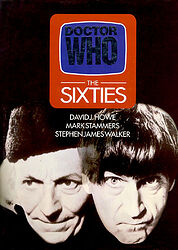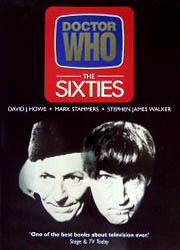 | Edition: | UK (hardback) | | | Released: | October 1992
| | | Publisher: | Virgin | | | ISBN: | 1-85227-420-4 | | | Format: | hardback | | | Owned: | | | | Buy: |  |  | | Used: | £34.12 |  |
| | Prices as of 5 Jul 17:10 GMT |
  |  | | Used: | $22.25 |  |
| | Prices as of 5 Jul 17:10 GMT |
  |  | (Unable to fetch price) |
  |
Cover blurb:
On 23 November 1963 a British institution was born. Almost thirty years later Doctor Who commands a following matched by no other British television programme. Yet in its early days the series had to face fierce opposition from within the BBC itself. However, the arrival of the series’ most popular monsters, the Daleks — soon to become a British cult icon — helped to secure Doctor Who’s continuing success. The Sixties is the definitive record of the programme’s early years when Doctor Who developed its unique character. It provides a fascinating insight into a production process very different from the sophisticated studio methods of today, and tells of the political wrangling within the BBC which nearly ended the programme before it had properly begun. Actors, writers, directors and crew recall their contributions in a decade which saw the move from primitive one-take studio sets to more elaborate and realistic location filming. The creative and technical processes involved in making Doctor Who are examined in detail, as is the impact of Doctor Who on all aspects of British culture in the sixties. Films and exhibitions are also covered, along with the many toys and games which flooded the market. Illustrated throughout with colour and black and white photographs, most of which have never been published before, this is a meticulous record of the early days of a cultural phenomenon. It is also a lovingly assembled history of the art of television in a decade perhaps less jaded than our own. David J Howe, Mark Stammers and Stephen James Walker are the team behind The Frame, one of the most polished and sophisticated of the Doctor Who fanzines. They have contributed to many books and journals on Doctor Who and are the authors of The Fourth Doctor Handbook. They are acknowledged experts on television history. | 


